Digital Higher Education: closing conference of the OECD project was hosted by Széchenyi University
As a leading institution in the field of digitalisation, Széchenyi István University hosted the closing conference of the Organisation for Economic Co-operation and Development (OECD) project on improving the quality of digital higher education in Hungary. At the event, it was announced that the government plans to further increase the flexibility and responsiveness of higher education.
The OECD, in cooperation with the Ministry of Culture and Innovation and the Hungarian Accreditation Committee (MAB), successfully implemented an international project between September 2021 and March this year, aimed at improving the quality of Hungarian digital higher education. The final event of the project took place at Széchenyi István University on 29 March, where the report "Ensuring Quality Digital Higher Education in Hungary" was presented.
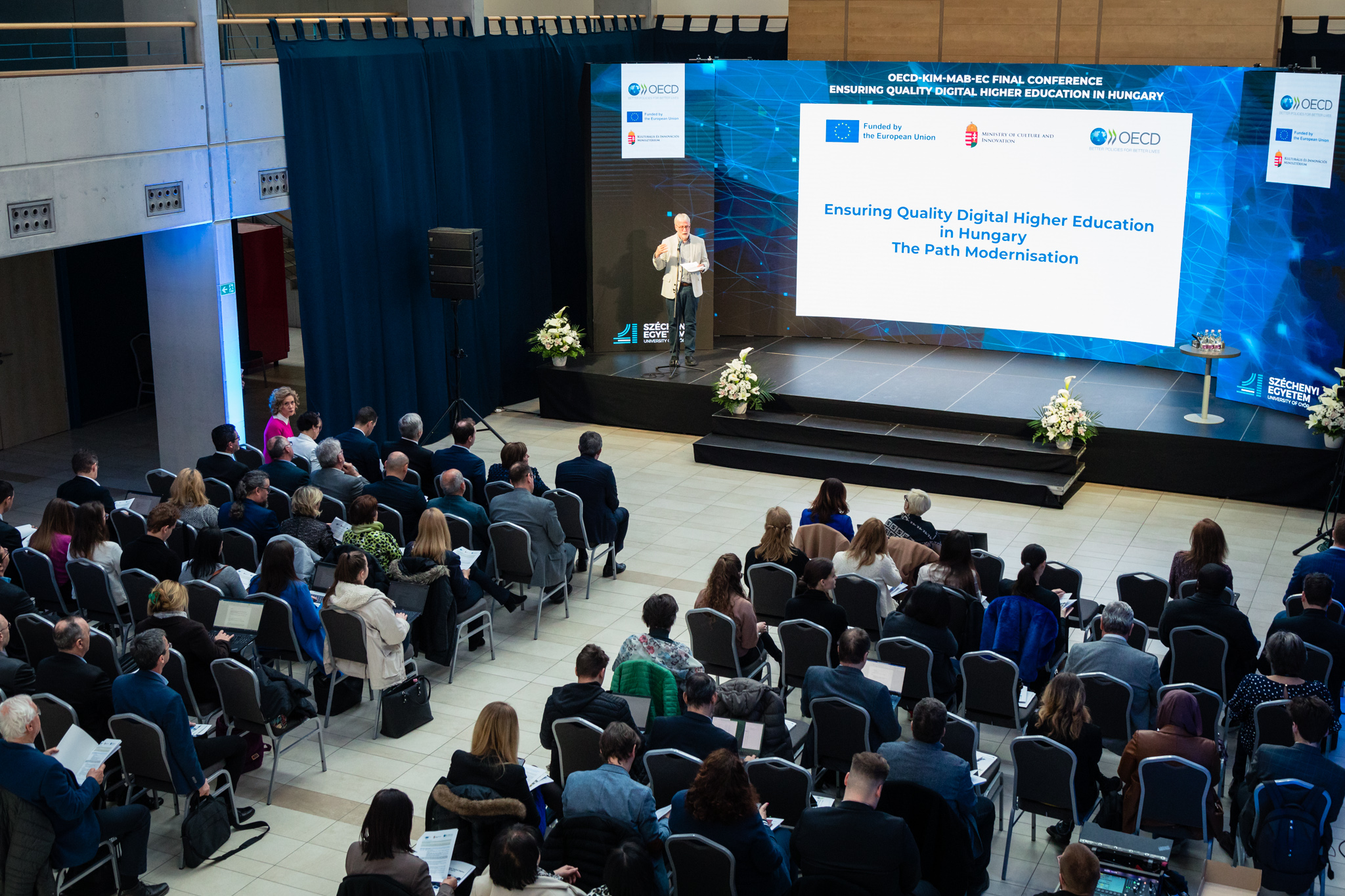 The hall of the New Knowledge Space building of Széchenyi István University was full for the event (Photo: Csaba József Májer)
The hall of the New Knowledge Space building of Széchenyi István University was full for the event (Photo: Csaba József Májer)
The development was implemented by the OECD with the support of the European Union, in cooperation with the European Commission's Directorate General for Structural Reform Support. As part of the project, a review of the regulatory framework and quality assurance system in higher education in Hungary was carried out, which identified a number of important areas for further development of quality assurance in online and hybrid education in Hungary.
To improve the quality of digital higher education in Hungary, the OECD recommends that the Ministry, the Hungarian Accreditation Committee and the higher education institutions support the modernisation of external and internal quality assurance to increase flexibility, innovation and digitisation. The project offers a range of policy options and international examples of best practice from the OECD and the EU from which all stakeholders can draw inspiration for the future development of the quality assurance system in Hungarian higher education.
Dr. Balázs Hankó, State Secretary for Innovation and Higher Education of the Ministry of Culture and Innovation welcomed the participants of the conference in a video message. He said: at the end of last year, the Hungarian Parliament adopted a package of legislative amendments to make it easier for students to choose what and how to study. "The government plans to further increase the flexibility and responsiveness of Hungarian higher education by introducing micro-certificates in higher education, by strengthening work-based learning opportunities in higher education programmes, and by focusing on the social dimension of higher education," he said. He added that the Hungarian Accreditation Committee plans to allow all accredited institutions to launch new master's programmes without prior approval. He stressed that they hope that these changes will give higher education institutions and academics greater autonomy and flexibility to experiment with innovative and digitally enhanced study programmes that meet the needs of students and the rapidly changing labour market.
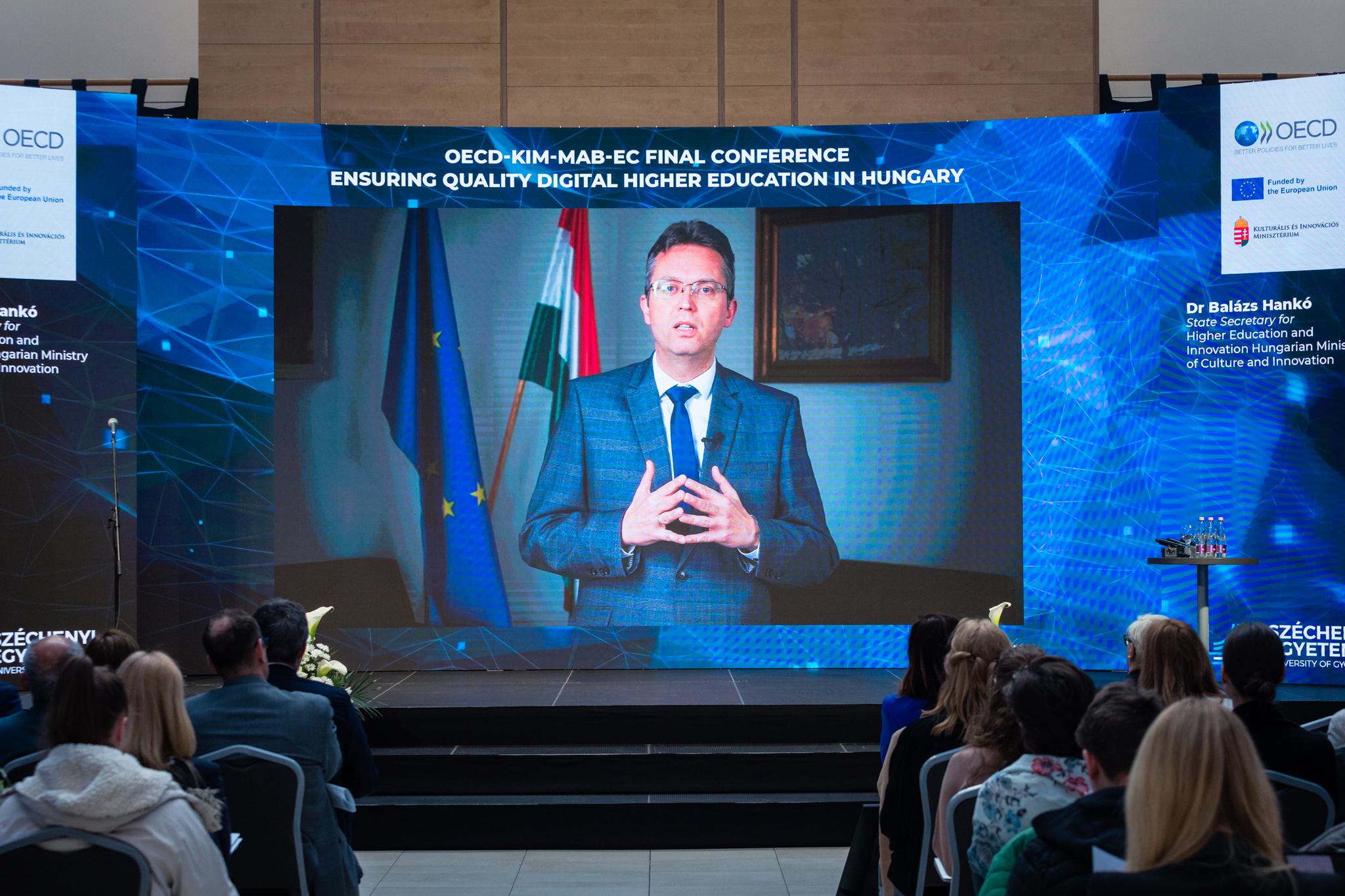 State Secretary Balázs Hankó stressed that at the end of last year, the Hungarian Parliament adopted a package of amendments to the law, which will make it easier for students to choose what and how to study. (Photo: Csaba József Májer)
State Secretary Balázs Hankó stressed that at the end of last year, the Hungarian Parliament adopted a package of amendments to the law, which will make it easier for students to choose what and how to study. (Photo: Csaba József Májer)
At the event, Prof. Dr. László Palkovics, Chairman of the Board of Trustees of the Széchenyi István University Foundation, said in his speech that digital higher education has become extremely valuable as a result of the coronavirus pandemic. "If we add to this the needs of the younger generations or even of those who continue their studies while working, we can say with certainty that concerted and continuous action in this field will be necessary in the coming years to support the profound modernisation of Hungarian higher education. Széchenyi István University also wishes to be an active part of this process. For decades, our institution has been characterized by its receptiveness to innovation, which has been supported by our new operating model for the past three years. Our new structure fully ensures the autonomy of the university, with a freer, more flexible framework than before, to help ensure the stability of management and strengthen efficiency and competitiveness. This is also linked to the theme of the conference, as digital higher education pointsus also towards increasing efficiency and competitiveness," he said.
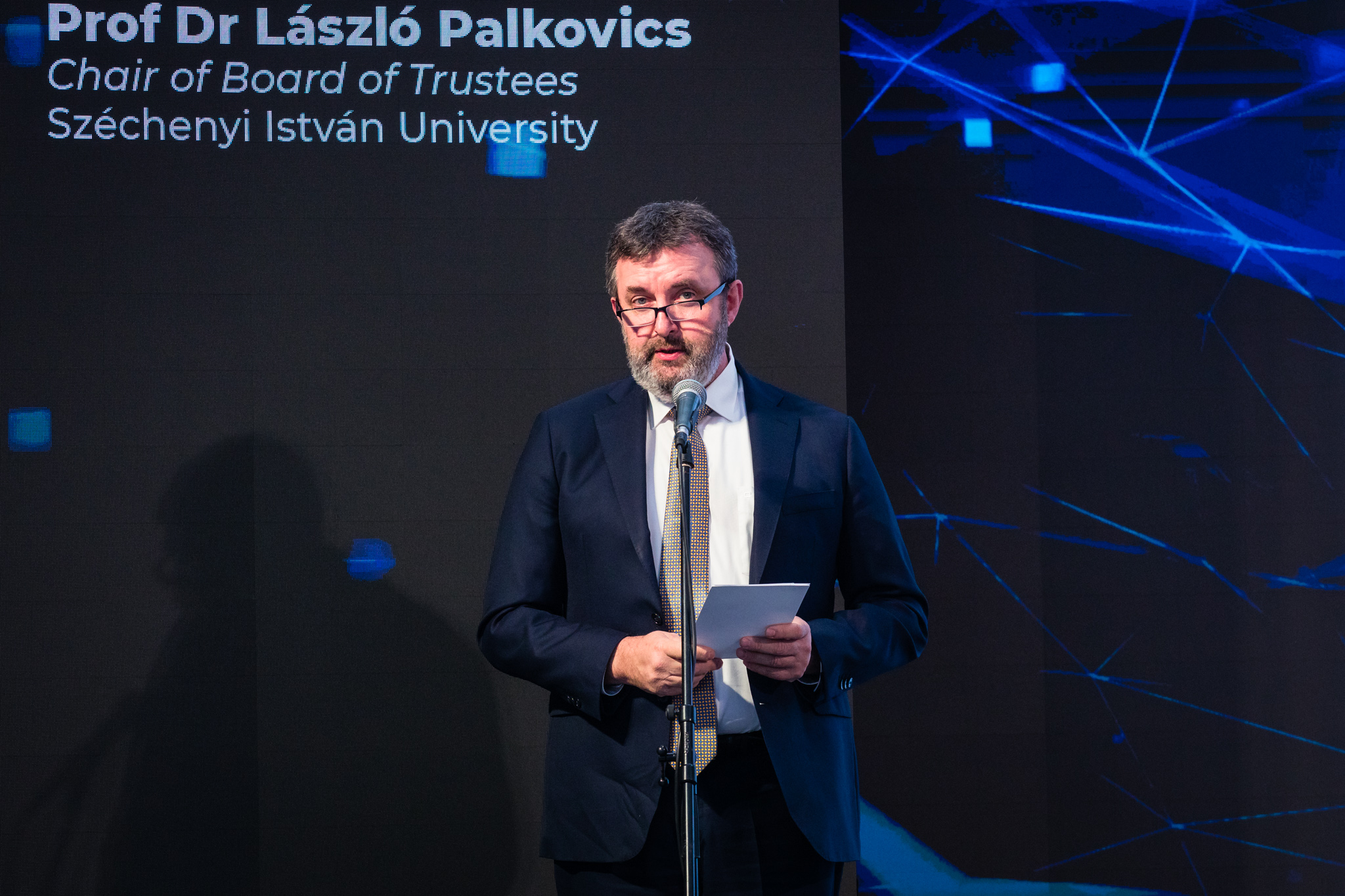 Prof. Dr. László Palkovics, Chairman of the Board of Trustees of the Széchenyi István University Foundation, said that Széchenyi István University has been characterized by its receptiveness to innovation for decades. (Photo: Csaba József Májer)
Prof. Dr. László Palkovics, Chairman of the Board of Trustees of the Széchenyi István University Foundation, said that Széchenyi István University has been characterized by its receptiveness to innovation for decades. (Photo: Csaba József Májer)
Dr Eszter Lukács, Vice President for Global Strategy of Széchenyi István University, stressed that as part of the internationalisation of the institution, they consider it important not only to increase the number of foreign students and English language courses, but also to cooperate with major international organisations such as the OECD. Regarding the project, she said that it was a great help that the OECD had reviewed the good practices of all member states, and that Hungarian institutions are able to select those that could be transferred to the Hungarian higher education system.
Prof. Dr. Valéria Csépe, President of the Hungarian Accreditation Committee (MAB), said that the essence of the project is that the conditions necessary for the development of digital higher education have been assessed on the basis of international examples, and it has been determined how the goals set by Hungary can be achieved. She said that the focus is on student-centeredness, i.e. how the use of modern technologies in education contributes to students acquiring up-to-date knowledge and competences and developing and expanding their skills as adults. Prof. Dr. Valéria Csépe said that the Hungarian Accreditation Committee plans to recognise universities that meet the requirements of digital higher education from 2024. She stressed that the Széchenyi István University was chosen as the venue for the closing conference because it is at the forefront of digitalisation.
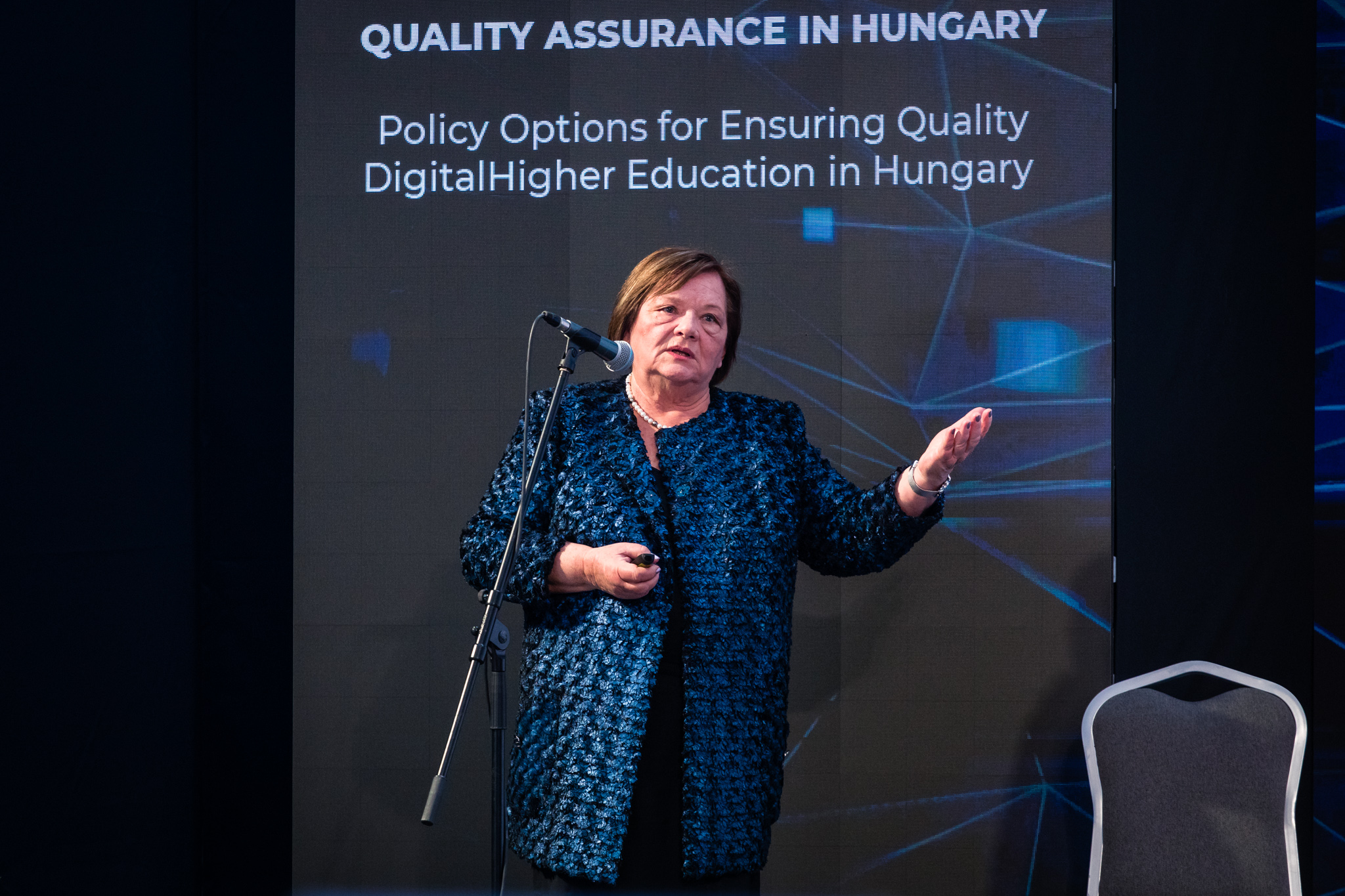 Prof. Dr. Valéria Csépe, President of the MAB, underlined that the emphasis is on student-centeredness (Photo: Csaba József Májer)
Prof. Dr. Valéria Csépe, President of the MAB, underlined that the emphasis is on student-centeredness (Photo: Csaba József Májer)
Participant of the conference were welcomed online by Andreas Schleicher, Head of the OECD's Education Directorate, who said: 'It is clear that the effective and good use of modern technologies represents a great opportunity for universities. He added: "This process will improve access to higher education, increasing equality, and will also enable new forms of training such as short courses and micro-credentials.
Francois Staring, OECD analyst and head of the project's proposal committee, told the conference that it is very important that students have the opportunity to learn not only in face-to-face but also in online and hybrid formats. He also said that it was essential to train teachers so that they could use digital platforms to deliver knowledge more effectively.
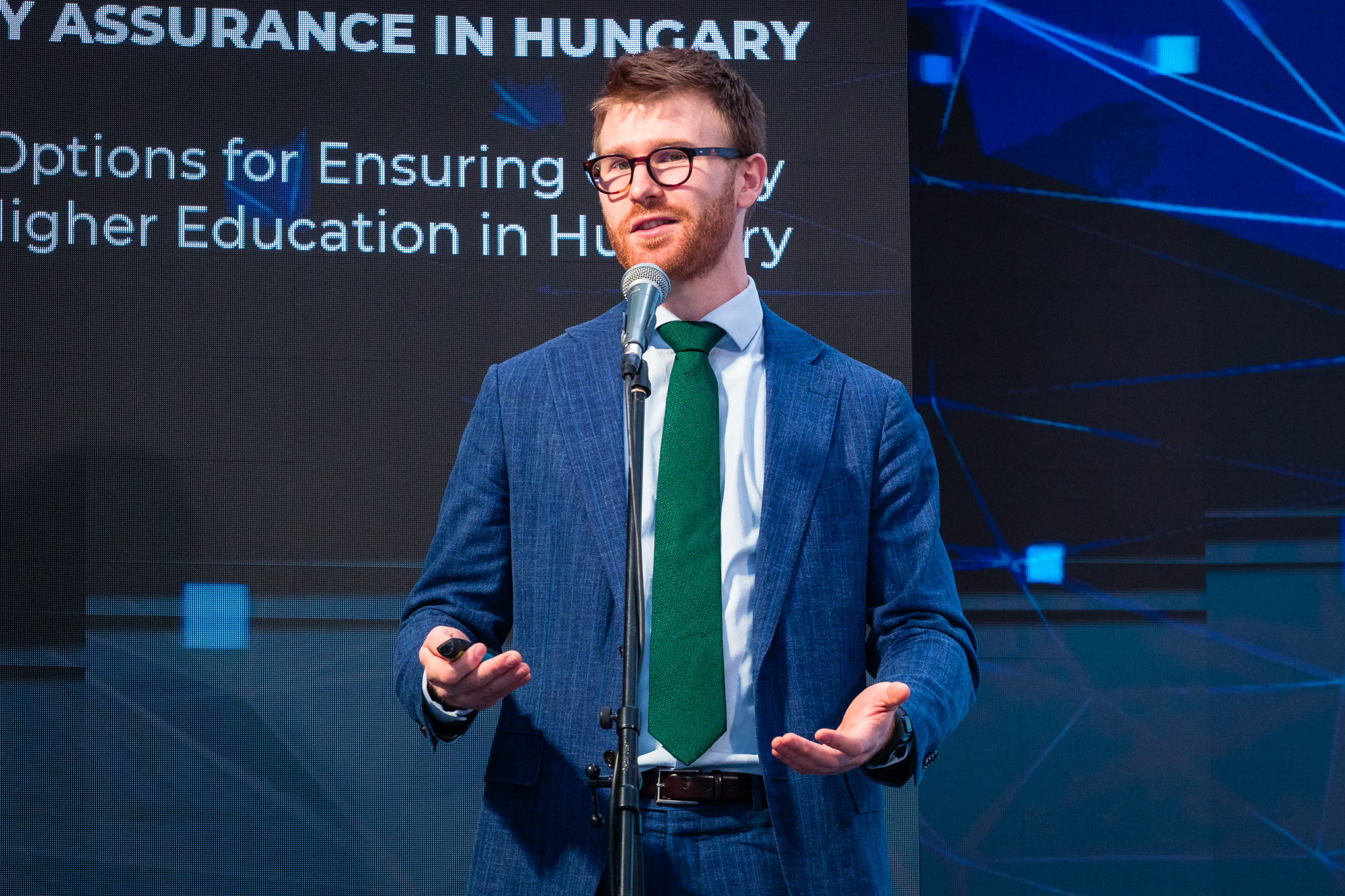 Francois Staring, OECD analyst and head of the project's proposal committee (Photo: Csaba József Májer)
Francois Staring, OECD analyst and head of the project's proposal committee (Photo: Csaba József Májer)











